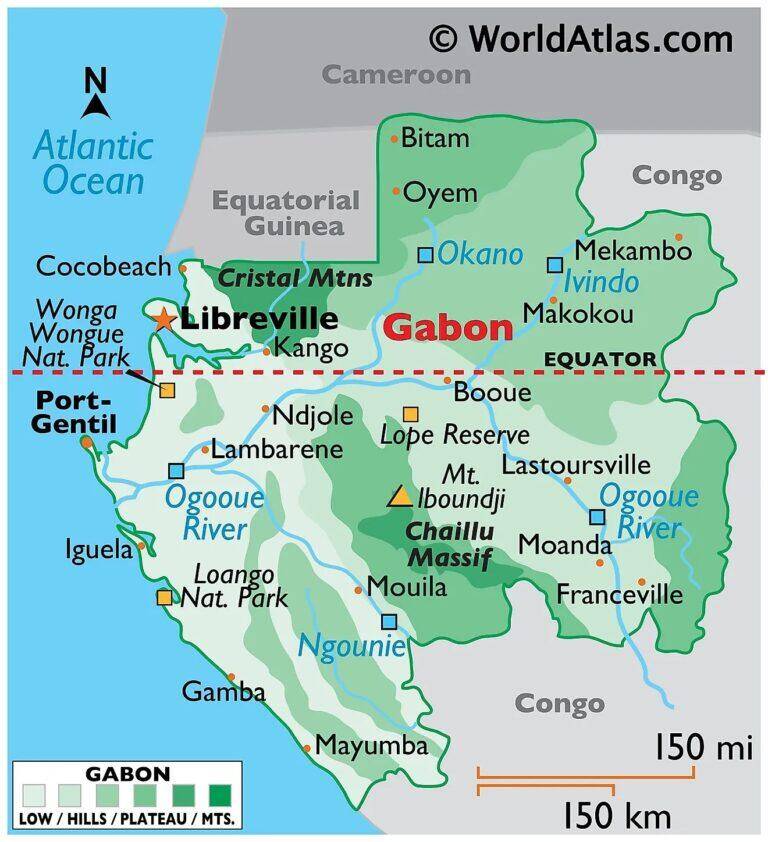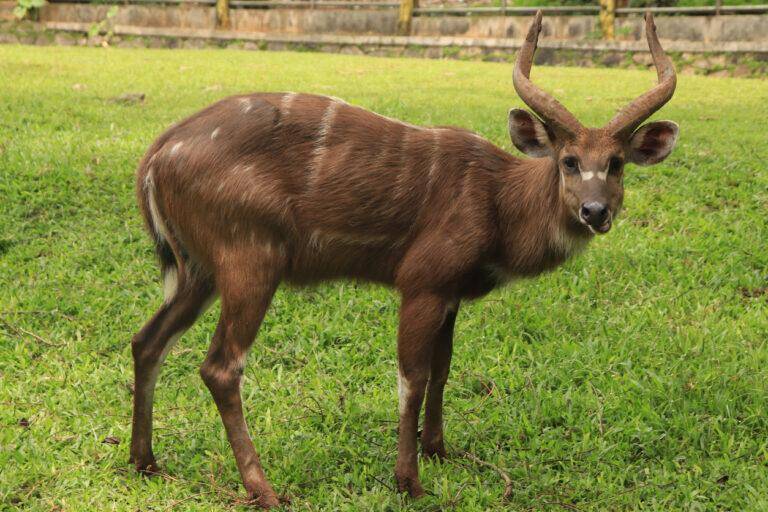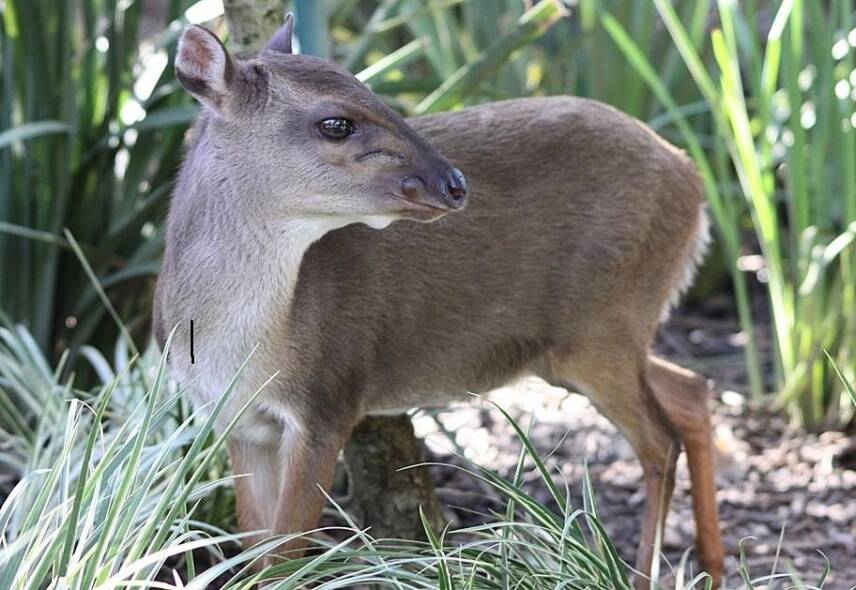Situated on Africa’s West Coast, Gabon is nestled on the Atlantic Ocean and shares its other borders with Cameroon in the north, the Republic of the Congo to the east and south, and Equatorial Guinea in the northwest. With a surface area just smaller than the state of Colorado in the United States, this equatorial country is a melting pot of cultures, experiences, and hunting adventures just waiting to be explored!
[DYNAMIC-BLOGTABLEOFCONTENT]
Key Takeaways
- Gabon is a small country located in Central Africa.
- It lies on the equator, resulting in a tropical climate of hot, humid weather with high rainfalls.
- Gabon is an undiscovered gem for game hunting enthusiasts, offering memorable hunting safaris with exotic species under challenging, yet rewarding, conditions.
- It offers hunters the choice of an array of exotic species, many of which are sought-after trophies.
- The hunting season in Gabon runs annually from the 16th March to the 14th September.
- Gabon offers a blend of natural beauty, culture, and exciting outdoor activities that make it an appealing destination for travelers
- Gabon can be reached from European as well as African destinations, but there aren’t any direct flights to the country from the USA.
Gabon at a Glance
- Size: 103,346 square miles (slightly smaller than the US State of Colorado)
- Population: 2,6 (estimated in 2025)
- Official Languages: French, with national languages of Fang and Myene also widely spoken
- Currency: CFA franc (XAF)
- Government: A republic, with the President as Head of State
- Capital City: Libreville

Climate & Topography
Climate
Gabon lies on the equator and has a hot and humid climate, with rainfall occurring throughout the year. While it varies from region to region, the average rainfall in Gabon ranges from 70-100 inches per annum. Coastal regions receive more precipitation than the interior regions and can reach up to 120 inches per year.
Gabon’s rainy season runs from October through to May, while the heaviest rainfall figures are recorded between November and February.
Topography
Gabon is characterized by a narrow coastal plain and a hilly interior, including mountains such as the Cristal Mountains and the Chaillu Massif. The highest point in Gabon is Mont Iboundji, standing at 51,67 feet.
Natural resources in the region include natural gas, diamonds, manganese, uranium, gold, timber, iron ore, and petroleum.
Why Choose to Go Hunting in Gabon?
A Gabon hunting safari ticks all the boxes in terms of ensuring authentic African hunting adventures, appealing to hunters worldwide. From authentic hunts and exquisite wildlife to lush environments and protection areas, Gabon remains a gem just waiting to be discovered by hunters worldwide.
- Authentic African Experience: Gabon hunting safaris offer a unique blend of untamed African landscapes, an array of species to hunt, and thrilling experiences, both while hunting and when exploring the local heritage and culture.
- Tropical Environment: Gabon experiences a tropical climate, with varied landscapes challenging hunters on their Gabon hunting safari. From the lush tropical rainforests to the savanna region, each offers different experiences for hunting enthusiasts.
- Gabon Wildlife: Gabon is home to a diverse range of species, including exotic antelope such as the sitatunga and many duiker species, as well as larger wildlife such as the forest buffalo and elephants.
- Conservation and Protected Areas: The Gabon government has established national parks and protected areas, all of which assist in ensuring healthy populations of species, allowing sustainable hunting to take place, and ensuring that the Gabon wildlife is not in any danger of numbers dropping below-accepted levels.
Traveling to Gabon
Gabon can be reached from European as well as African destinations, but there aren’t any direct flights to the country from the USA.
Gabon has one international airport (Léon-Mba International Airport) in Libreville, while numerous smaller airports cover regional and domestic flights.
As an American, a visa is required to enter Gabon, while citizens from many African countries do not require a visa.
While some nationalities are eligible for a visa on arrival, this is not guaranteed for US citizens, and it is recommended to arrange your visa a week or 10 days before your arrival. US citizens can apply for an e-Visa, which is valid for stays up to 30 days. For longer stays or different types of visas, they must apply through the Gabonese Embassy or Consulate.
When is the Best Time to Enjoy Hunting in Gabon?
The hunting season in Gabon runs annually from the 16th March to the 14th September. This coincides with the drier months in Gabon, even though the rainfall is year-round, the wetter months are from November to May.
Medical Requirements
To enter the country, certain inoculations are required, including:
- Yellow Fever Vaccination: This is mandatory for all travelers over one year of age and needs to be administered at least 10 days prior to arrival in Gabon
- Updated routine inoculations (MMR, Chickenpox, Polio, etc)
- Hepatitis A
- Hepatitis B
- Typhoid
- Meningitis
- Rabies
- Cholera
- Tdap (Tetanus, Diphtheria, Pertussis)
- Malaria medication, started before arrival in Gabon, due to the high prevalence of mosquitoes on the area
- Polio – Adult booster recommended
Gabon is a malaria area, and additional measures are suggested to combat mosquitoes. These include using an insect repellant containing DEET, wearing long-sleeved shirts and long trousers as well as sleeping under mosquito nets.
Popular Game Hunting Species to Target on Gabon Safaris
Gabon offers hunters a unique blend of tropical rainforests and diverse wildlife species, ensuring an action-packed adventure on a Gabon hunting safari.
The Sitatunga
This antelope, also referred to as the marshbuck, is known for its ability to evade predators (and hunters) by heading off into the wetlands of marshes and swamps, which is also its preferred habitat. The sitatunga (Tragelaphus spekii) is a medium-sized antelope native to central Africa.
A sub-species of Sitatunga, the Western sitatunga (T. s. gratus), also known as the forest or Congo sitatunga, is found in central and west Africa.

Black-Fronted Duiker
The black-fronted duiker (Cephalophus nigrifrons) derives its name from the wide black streak that runs from its nose to its forehead. Its tail is short and black, with a white tip, while its coat is reddish to dark brown. Both sexes have short horns.
This duiker can be quite a challenging hunting safari, with hunters finding it tricky to track and stalk the antelope in wet conditions.
Blue Duiker
Secretive, silent, and extremely difficult to spot in the lush vegetation, the blue duiker (Philantomba monticola) remains a sought-after species when hunting in Gabon. These tiny antelopes inhabit lowland forests, farmlands, dense thickets, and coastal scrubs, and are more active at dusk and dawn, with their shy and elusive natures making them a challenging hunt.
The Blue duiker is the tiniest of the duiker species, and is native to Central, Eastern, and Southern Africa.
Bay Duiker
Native to west and central Africa, the Bay duiker (Cephalophus dorsalis), is a medium-sized forest-dwelling duiker that is native to western and central Africa. Known under a variety of names including the black-striped duiker or the black-backed duiker, they prefer forest-type habitats and vegetation, and this, together with their shy and elusive natures, makes them a challenge to spot and stalk. These antelopes are known for their ability to move soundlessly through the dense undergrowth without being noticed, seamlessly blending in with the environment.
The Yellow-Backed Duiker
The largest of the duiker family, the yellow-backed duiker (Cephalophus silvicultor) tips the scales at around 130 pounds. Inhabiting forest blocks in central and west Africa, the yellow-backed duiker is a shy antelope, with its name derived from a triangular patch of yellow fur that occurs on its rump. This patch of fur stands upright when the animal is alarmed or feels threatened.
Their preference for habitats including thick undergrowth in the dense rainforests makes them a challenge for hunters to see, while they can spot the hunters and soundlessly escape into the undergrowth.
The Red River Hog
Found in west and central Africa, the red river hog (Potamochoerus porcus) is a member of the swine family. This hog prefers habitats close to water, such as rivers and swamps, making it a challenge to track and stalk undetected.
Red river hog hunts are offered in the Central African Republic, Cameroon, and the Republic of Congo, as well as under special license on a Gabon safari.
Peter’s Duiker
This species of duiker only occurs close to the equator, westward from the Congo River to the Gulf of Guinea, where they thrive in lowland forests, on a diet of mainly fruits, leaves, and other plant matter. Peter’s duiker (Cephalophus callipygus) inhabits the Congolian tropical forest belt and is found in Gabon, Equatorial Guinea, southern Cameroon, as well as the northern Republic of Congo, where they remain a sought-after trophy due to their rarity.
The Dwarf Forest Buffalo
These are a protected species in Gabon, and although you may not be able to hunt them, just meeting them in the dense rainforests while pursuing another target, is an unforgettable experience.
These buffalo are known by a variety of names and are the smallest of the African buffalo subspecies
Tourist Activities in Gabon
Gabon offers a blend of natural beauty, culture, and exciting outdoor activities that make it an appealing destination for travelers.
- Gabon is home to 13 national parks that provide the perfect backdrop for Gabon wildlife safaris, trekking, and observing diverse wildlife. These include species such as gorillas, hippos, and elephants.
- Pointe Denis Beach is the place to be to see leatherback turtles nesting on the beaches, with December and January being the prime months to observe them.
- For those interested in beautiful beaches, great waves, and amazing views on a beach walk, then Pointe Denis Beach is the place to go!
- Markets: Visiting markets like Mont-Bouët in Libreville provides an opportunity to experience local culture and shop for curios.
- Libreville: Gabon’s capital city is alive with culture, including attractions such as the National Museum of Arts and Tradition, St. Peter’s Cathedral, and L’Eglise St-Michel.
- July to September is whale watching season, with the humpback whales active off Gabon’s coastline,
Frequently Asked Questions
Is it legal to hunt in Gabon?
Gabon hunting safaris are indeed legal. There are rules, regulations, and licenses issued when relating to hunting, ensure that you abide by these while on your Gabon safari.
Are there safaris in Gabon?
Yes, there are safaris in Gabon, with many differing experiences available, while taking in the dense rainforests and diverse landscapes. Tourists can have wildlife encounters with varied species including gorillas, chimpanzees, and elephants. Tourists can explore the national parks and enjoy tourist activities such as fishing, watersports, hunting, and hiking.
Is it safe to travel to Gabon?
Yes, Gabon remains safe to travel to, but just like with any destination worldwide, keep vigilant and informed of local conditions.
Why do people travel to Gabon?
People travel to Gabon for several reasons, primarily due to its rich natural beauty and diverse cultural experiences. From enjoying kayaking along the Ogooué River, watersports, and watching the leatherback turtles at Pointe Denis Beach to visiting local landmarks and national parks for the diverse game species, Gabon has something for everyone to enjoy.
Can you hunt the Dwarf buffalo in Gabon?
No, the dwarf buffalo is an endangered species in the area and is not available on any Gabon safaris.
Gabon Safaris: An Unforgettable African Adventure
Gabon remains an undiscovered gem, offering memorable hunting safaris with exotic species under challenging, yet rewarding, conditions. If you want to experience an authentic African hunt, with exceptional trophies and unforgettable memories, head to Gabon. From large antelope such as the striking sitatunga to a diverse array of duikers to test a hunter’s skills, patience, and perseverance, this destination offers hunters the opportunity to experience Gabon wildlife at its best.
